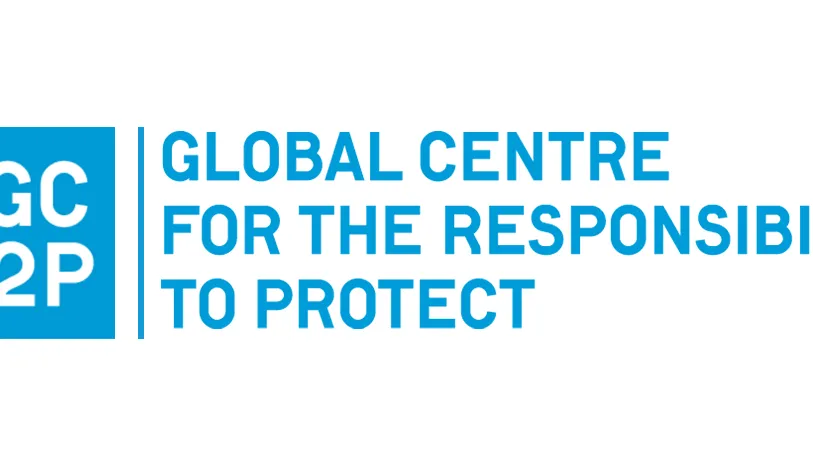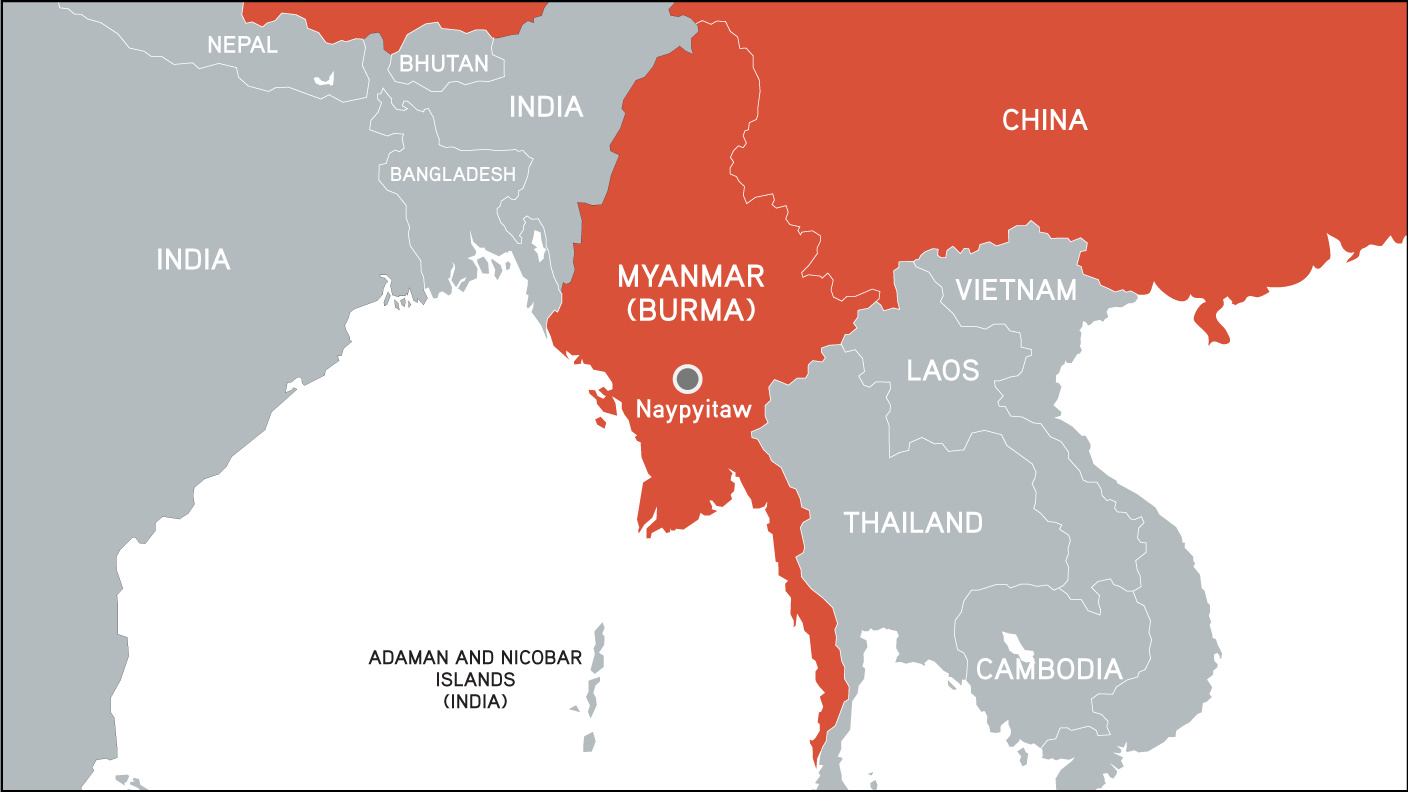Myanmar (Burma): Populations at Risk


RISK LEVEL: CURRENT CRISIS
BACKGROUND:
Since the February 2021 military coup and prolonged states of emergency, the military – known as the Tatmadaw – has compounded the human rights and humanitarian crisis in Myanmar (Burma). In the immediate aftermath, hundreds of thousands of people participated in peaceful protests and strikes against the re-imposition of military rule, while numerous civilian militias – known as People’s Defence Forces (PDFs) – subsequently formed as part of an armed resistance. The military has charged members of the National Unity Government (NUG) – a coalition of democratically elected politicians formed in opposition to military rule – with high treason and pronounced that the NUG and PDFs are terrorist organizations. The Tatmadaw has detained thousands of people accused of resisting the junta, with 20,454 people remaining detained. At least 5,050 people have been killed by the military and anti-junta groups, while 3 million have been displaced – 90 percent since the coup.
The military has targeted civilian areas with airstrikes, scorched earth campaigns and other attacks, particularly in the anti-military strongholds of Magway and Sagaing regions and Chin, Kachin, Shan, Kayah and Karen states. The UN High Commissioner for Human Rights, Volker Türk, has documented a two-fold increase in junta airstrikes since April 2022 that have indiscriminately targeted schools and other civilian infrastructure. According to High Commissioner Türk, at least 1,600 civilians were killed in 2023 alone, a 400 percent increase from 2022. The High Commissioner has also reported other abuses by the junta, including the systematic denial of humanitarian aid to civilians, intentional blocking of humanitarian access, abuses against aid workers and burning alive, dismembering, raping and beheading civilians unable to flee attacks. The Women’s League of Burma has also documented conflict-related sexual violence, including incidents where women were gang-raped by soldiers and raped at checkpoints.
On 27 October 2023 a coalition of ethnic resistance organizations (EROs) launched “Operation 1027” against the junta, capturing military outposts in Shan, Kachin, Sagaing, Magway and Kayah states. Other groups have subsequently increased attacks, including some PDFs and the Arakan Army (AA) in Rakhine State. According to the Special Advisory Council for Myanmar – comprised of three former UN experts on Myanmar – the junta has lost control of at least 86 percent of the country. Fighting has killed at least 554 civilians and displaced over 800,000, according to the UN Office for the Coordination of Humanitarian Affairs.
Numerous governments have attempted to restrict the junta’s capacity to commit crimes through a variety of measures, including by imposing extensive targeted sanctions on its leaders, military-affiliated companies and others who enable their crimes, suspending development funds, imposing arms embargos, banning dual-use goods and halting the supply of aviation fuel. The Association of Southeast Asian Nations (ASEAN) agreed to a “Five-Point Consensus,” which called for a cessation of hostilities, among other steps, in April 2021. In December 2022 the UN Security Council (UNSC) passed the first and only resolution on the human rights crisis, demanding an end to the violence and calling for political prisoners to be released.
Prior to the coup, in August 2017 the military launched so-called “clearance operations” in Rakhine State with the purported aim of confronting the Arakan Rohingya Salvation Army. During those operations the majority of Myanmar’s Rohingya population were forced to flee, bringing the total number of Rohingya refugees in Bangladesh to over 900,000 people. In 2018 the UN Human Rights Council-mandated Fact-Finding Mission on Myanmar concluded that senior members of the military, including General Min Aung Hlaing, should be prosecuted for genocide against the Rohingya, as well as for crimes against humanity and war crimes in Kachin, Rakhine and Shan states. Despite ongoing risks underscored by the UN and international human rights organizations, the junta and Bangladesh have promoted a “pilot repatriation program” for Rohingya to return to Myanmar.
Several processes are underway to investigate and potentially hold perpetrators accountable for crimes against the Rohingya. This includes the UN Independent Investigative Mechanism for Myanmar, an International Criminal Court (ICC) investigation and a trial at the International Court of Justice (ICJ) initiated by The Gambia accusing Myanmar of violating its obligations under the Genocide Convention. Cases have also been filed under the principle of universal jurisdiction in Argentina, the Philippines and Türkiye.
RECENT DEVELOPMENTS:
While fighting has continued to escalate across the country, the situation is particularly dire in Rakhine State. The junta has intentionally stoked inter-communal conflict between the ethnic Rakhine and the Rohingya by orchestrating Rohingya protests against the AA and by reportedly encouraging Rohingya military conscripts to set fire to the homes of ethnic Rakhine. On 17 May, following the takeover of the town of Buthidaung by the AA, tens of thousands of Rohingya were displaced and at least 30 killed after the AA reportedly set fire to their homes – a claim the AA denies.
On 4 April the UNSC held its first open briefing on Myanmar since 2019. That same day, the HRC adopted a resolution calling on member states to end the sale of aviation fuel to the junta. On 5 April the UN Secretary-General appointed Julie Bishop as the new Special Envoy for Myanmar.
In April the junta began to forcibly recruit at least 5,000 people per month into military service. According to Human Rights Watch, the military has abducted and forcibly recruited more than 1,000 Rohingya men and boys from across Rakhine State alone, reportedly sending them to the front lines amid the surge in fighting. The military has promised them residence papers denied to Rohingyas since the 1982 Citizenship Law rendered them stateless.
ANALYSIS:
Impunity for past atrocities has enabled the military to continue committing widespread and systematic human rights violations and abuses against civilians, particularly those from ethnic minority populations and those who are perceived as unsupportive of the junta. Operation 1027 is the most significant challenge to the junta since the coup and has prompted an intensification of indiscriminate, disproportionate and targeted attacks on civilians.
Military forces perpetrated pervasive sexual and gender-based violence during the Rohingya clearance operations and appear to be continuing this pattern of abuse against those perceived as resisting the junta. The Rohingya remain at heightened risk of recurrent atrocities, including genocide, due to the junta intentionally stoking inter-communal tensions in Rakhine State.
The enforcement of the conscription law threatens populations with further abuse, especially ethnic minority groups. Some EROs have also been accused of human rights abuses, including the use of child soldiers.
Divisions within the UNSC and ASEAN have hampered the development of a coordinated international response to atrocities in Myanmar, further enabling ongoing abuses. Although many states have imposed sanctions on junta officials, as well as individuals and entities supporting the junta, fuel and arms continue to be shipped into Myanmar, including from entities based in countries imposing sanctions.
The coup, ongoing hostilities and a lack of trust complicate the prospects for the safe, dignified and voluntary repatriation of Rohingya refugees from Bangladesh.
RISK ASSESSMENT:
- Impunity for decades of atrocities perpetrated by the military.
- History of institutionalized persecution and discrimination against ethnic minority groups.
- The military’s continued access to weapons, aviation fuel and money, providing the means to perpetrate atrocities.
- Indiscriminate attacks on civilian infrastructure while targeting anti-military strongholds.
- Increasing desperation of the junta to quell armed resistance and the effects of Operation 1027.
NECESSARY ACTION:
The UNSC should impose a comprehensive arms embargo and targeted sanctions on Myanmar and refer the situation to the ICC. China, Russia, India and others must halt weapons transfers to Myanmar’s military. All UN member states, regional organizations and the UNSC should impose economic sanctions on Myanmar’s oil and gas sector and block the military’s access to aviation fuel. Foreign companies should immediately divest and sever ties with all businesses linked to the military.
The junta should not be diplomatically recognized as the legitimate representatives of Myanmar. ASEAN member states should condemn the Tatmadaw and increasingly engage with the NUG. International donors should utilize local humanitarian organizations for aid distribution to ensure lifesaving care and services reach those beyond junta-controlled areas.
More states should formally intervene in the ICJ case. All those responsible for atrocity crimes, including senior military leaders, should face international justice.
Announcements
28 February 2025
Asian NGO Network on National Human Rights Institutions , CSO Working Group on Independent National Human Rights Institution (Burma/Myanmar)
Open letter: Removal of the membership of the dis-accredited Myanmar National Human Rights Commission from the Southeast Asia National Human Rights Institution Forum

Progressive Voice is a participatory rights-based policy research and advocacy organization rooted in civil society, that maintains strong networks and relationships with grassroots organizations and community-based organizations throughout Myanmar. It acts as a bridge to the international community and international policymakers by amplifying voices from the ground, and advocating for a rights-based policy narrative.